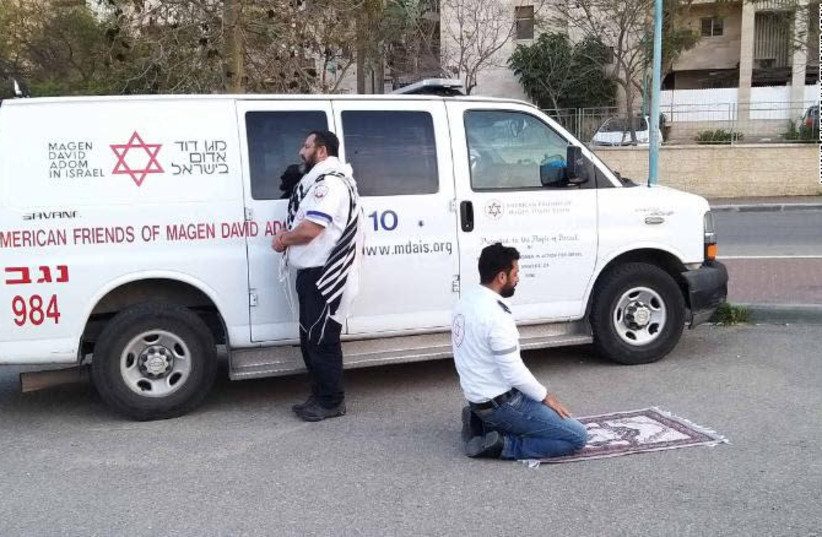In June 2019, Mrs. Sabra applied in person at the U.S. Embassy in Jerusalem (the “Embassy”) for a Consular Report of Birth Abroad (“CRBA”) and U.S. passport as proof of Baby M’s U.S. citizenship, citing a need for urgent medical treatment in the United States. Mrs. Sabra did not provide any travel plans for Baby M’s urgent medical care, and Baby M did not attend the in-person interview because she was hospitalized. Because Mrs. Sabra failed to provide written medical records to substantiate Baby M’s medical condition, the Embassy did not excuse Baby M’s personal appearance. Given Mrs. Sabra’s “advanced age,” the Embassy requested documentary evidence establishing that Mrs. Sabra was Baby M’s mother. Due to the indicia of fraud and inconsistencies in the submissions, the Embassy extended the deadline for the submission of additional evidence to establish Baby M’s claim to U.S. citizenship. Litigation ensued. After Baby M’s health became stable, Mr. and Mrs. Sabra declined the Embassy’s offer to apply in person with Baby M for the CRBA and U.S. passport. In October 2019, the Embassy denied Mrs. Sabra’sReading further, it looks like Baby M either does not exist or is someone else's baby who is paying the Sabras to make her a US citizen.
applications.
For a baby to become a citizen, he or she has to show up in person. The only exception is if they are ill, in which case evidence must be brought to prove both the birth and the illness.
It gets interesting:
Mrs. Sabra presented a “Pediatric Admission Form,” which was primarily written in English, as evidence of Baby M’s medical condition, but Vice-Consul Woda determined that the document did not appear to be prepared “in the regular course of [Baby M’s] medical treatment.” Vice-Consul Woda observed that the form did not indicate the hospital that generated the form and concluded that the form was “prepared specifically for presentation to the Embassy” because it is “written entirely in English.”Evidence that the entire thing was a scam accumulated:
According to Vice-Consul Woda, Mrs. Sabra claimed that Baby M was born at a private clinic during the June 12, 2019 interview. Mrs. Sabra did not provide any documentary evidence of post-natal care. Neither did Mrs. Sabra provide information about the Sabra family’s travel plans to the United States for Baby M’s medical treatment. Vice-Consul Woda avers that “[Mrs.] Sabra could not explain how [Baby M] would be able to take a transatlantic flight to the United States, which would first require overland travel to Amman, Cairo, or Tel Aviv, when [Baby M] was not well enough to appear for the interview at the Erez crossing, and appeared to have no plan [for] the child’s travel or subsequent treatment.”
At some point, the Embassy received a discharge record indicating that Baby M was born in a “private clinic.”...stating that “the attached Exhibit A is the discharge record from the clinic where [Baby M] was born, issued and stamped by the Palestinian National Authority, which shows [Mrs.] Sabra and [Mr.] Sabra to be the parents of [Baby M]”). The machine-printed birth certificate contains white-out and a handwritten alteration at box 5 “Place of birth.” The words “private clinic,” in Arabic, were written by hand over the whiteout.
Given Mrs. Sabra’s claims that Baby M’s life was in danger, the Embassy offered to assist the family with obtaining a permit for Baby M in order for her to receive medical treatment in Israel. The Sabra family declined the Embassy’s offer.
On June 25, 2019, the Embassy’s ACS Unit received an e-mail from Plaintiff’s counsel. Plaintiff’s counsel “asserted that DNA testing is against [Mrs.] Sabra’s sincerely held religious beliefs as a practicing Muslim and that [Baby M] could not withstand ‘either the trip to the Embassy for a DNA sample or the thirty (30) day wait for results articulated by U.S. Embassy officials in Jerusalem – without urgent medical treatment which she cannot receive in Gaza, Baby M is not likely to survive another thirty days.’” In response, on June 28, 2019, the Embassy reiterated its offer to assist the Sabra family to obtain permits from the Israeli government for Baby M’s urgent medical treatment. Id. Again, the Sabra family declined the Embassy’s offer.The family also claimed that a doctor had delivered and taken care of the baby, with a letter in English. When the US officials called the doctor, he said he doesn't speak English, and through a translator he said he did not deliver the baby nor had he ever treated her. He was called to their house after the baby was already born, it is unclear if he ever saw her.
Moreover, the family claimed that they could not submit the baby to a DNA test or provide photos of Pomm while pregnant because of their religious beliefs. I can find no evidence that Muslim law disallows either DNA testing or showing photographs of a pregnant woman.
After the US denied the attempt to give the baby a US passport, Mohammed Sabra sued, and this lawsuit was dismissed in light of the evidence.
What makes this more interesting is that it appears that it was quite easy for the Sabras to obtain Palestinian Authority stamps and documentation for what is probably a fictional baby.
(h/t Bill P)

 Elder of Ziyon
Elder of Ziyon



































